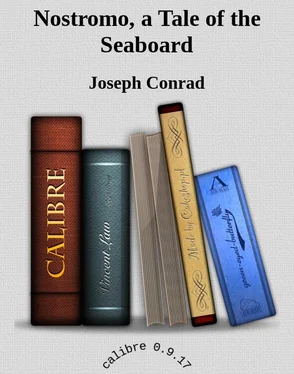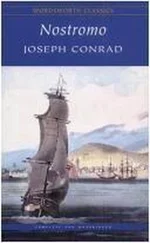Joseph Conrad - Nostromo, a Tale of the Seaboard
Здесь есть возможность читать онлайн «Joseph Conrad - Nostromo, a Tale of the Seaboard» весь текст электронной книги совершенно бесплатно (целиком полную версию без сокращений). В некоторых случаях можно слушать аудио, скачать через торрент в формате fb2 и присутствует краткое содержание. Жанр: Старинная литература, на английском языке. Описание произведения, (предисловие) а так же отзывы посетителей доступны на портале библиотеки ЛибКат.
- Название:Nostromo, a Tale of the Seaboard
- Автор:
- Жанр:
- Год:неизвестен
- ISBN:нет данных
- Рейтинг книги:4 / 5. Голосов: 1
-
Избранное:Добавить в избранное
- Отзывы:
-
Ваша оценка:
- 80
- 1
- 2
- 3
- 4
- 5
Nostromo, a Tale of the Seaboard: краткое содержание, описание и аннотация
Предлагаем к чтению аннотацию, описание, краткое содержание или предисловие (зависит от того, что написал сам автор книги «Nostromo, a Tale of the Seaboard»). Если вы не нашли необходимую информацию о книге — напишите в комментариях, мы постараемся отыскать её.
Nostromo, a Tale of the Seaboard — читать онлайн бесплатно полную книгу (весь текст) целиком
Ниже представлен текст книги, разбитый по страницам. Система сохранения места последней прочитанной страницы, позволяет с удобством читать онлайн бесплатно книгу «Nostromo, a Tale of the Seaboard», без необходимости каждый раз заново искать на чём Вы остановились. Поставьте закладку, и сможете в любой момент перейти на страницу, на которой закончили чтение.
Интервал:
Закладка:
Old Giorgio's heavy frame shook from head to foot with the effort to overcome his emotion at the sight of that man, who had shared the intimacies of his domestic life as though he had been a grown-up son.
"She believed you would return," he said, solemnly.
Nostromo raised his head.
"She was a wise woman. How could I fail to come back——?"
He finished the thought mentally: "Since she has prophesied for me an end of poverty, misery, and starvation." These words of Teresa's anger, from the circumstances in which they had been uttered, like the cry of a soul prevented from making its peace with God, stirred the obscure superstition of personal fortune from which even the greatest genius amongst men of adventure and action is seldom free. They reigned over Nostromo's mind with the force of a potent malediction. And what a curse it was that which her words had laid upon him! He had been orphaned so young that he could remember no other woman whom he called mother. Henceforth there would be no enterprise in which he would not fail. The spell was working already. Death itself would elude him now. . . . He said violently—
"Come, viejo! Get me something to eat. I am hungry! Sangre de Dios! The emptiness of my belly makes me lightheaded."
With his chin dropped again upon his bare breast above his folded arms, barefooted, watching from under a gloomy brow the movements of old Viola foraging amongst the cupboards, he seemed as if indeed fallen under a curse—a ruined and sinister Capataz.
Old Viola walked out of a dark corner, and, without a word, emptied upon the table out of his hollowed palms a few dry crusts of bread and half a raw onion.
While the Capataz began to devour this beggar's fare, taking up with stony-eyed voracity piece after piece lying by his side, the Garibaldino went off, and squatting down in another corner filled an earthenware mug with red wine out of a wicker-covered demijohn. With a familiar gesture, as when serving customers in the cafe, he had thrust his pipe between his teeth to have his hands free.
The Capataz drank greedily. A slight flush deepened the bronze of his cheek. Before him, Viola, with a turn of his white and massive head towards the staircase, took his empty pipe out of his mouth, and pronounced slowly—
"After the shot was fired down here, which killed her as surely as if the bullet had struck her oppressed heart, she called upon you to save the children. Upon you, Gian' Battista."
The Capataz looked up.
"Did she do that, Padrone? To save the children! They are with the English senora, their rich benefactress. Hey! old man of the people. Thy benefactress. . . ."
"I am old," muttered Giorgio Viola. "An Englishwoman was allowed to give a bed to Garibaldi lying wounded in prison. The greatest man that ever lived. A man of the people, too—a sailor. I may let another keep a roof over my head. Si . . . I am old. I may let her. Life lasts too long sometimes."
"And she herself may not have a roof over her head before many days are out, unless I . . . What do you say? Am I to keep a roof over her head? Am I to try—and save all the Blancos together with her?"
"You shall do it," said old Viola in a strong voice. "You shall do it as my son would have. . . ."
"Thy son, viejo! .. .. There never has been a man like thy son. Ha, I must try. . . . But what if it were only a part of the curse to lure me on? . . . And so she called upon me to save—and then——?"
"She spoke no more." The heroic follower of Garibaldi, at the thought of the eternal stillness and silence fallen upon the shrouded form stretched out on the bed upstairs, averted his face and raised his hand to his furrowed brow. "She was dead before I could seize her hands," he stammered out, pitifully.
Before the wide eyes of the Capataz, staring at the doorway of the dark staircase, floated the shape of the Great Isabel, like a strange ship in distress, freighted with enormous wealth and the solitary life of a man. It was impossible for him to do anything. He could only hold his tongue, since there was no one to trust. The treasure would be lost, probably—unless Decoud. . . . And his thought came abruptly to an end. He perceived that he could not imagine in the least what Decoud was likely to do.
Old Viola had not stirred. And the motionless Capataz dropped his long, soft eyelashes, which gave to the upper part of his fierce, black-whiskered face a touch of feminine ingenuousness. The silence had lasted for a long time.
"God rest her soul!" he murmured, gloomily.
CHAPTER TEN
The next day was quiet in the morning, except for the faint sound of firing to the northward, in the direction of Los Hatos. Captain Mitchell had listened to it from his balcony anxiously. The phrase, "In my delicate position as the only consular agent then in the port, everything, sir, everything was a just cause for anxiety," had its place in the more or less stereotyped relation of the "historical events" which for the next few years was at the service of distinguished strangers visiting Sulaco. The mention of the dignity and neutrality of the flag, so difficult to preserve in his position, "right in the thick of these events between the lawlessness of that piratical villain Sotillo and the more regularly established but scarcely less atrocious tyranny of his Excellency Don Pedro Montero," came next in order. Captain Mitchell was not the man to enlarge upon mere dangers much. But he insisted that it was a memorable day. On that day, towards dusk, he had seen "that poor fellow of mine—Nostromo. The sailor whom I discovered, and, I may say, made, sir. The man of the famous ride to Cayta, sir. An historical event, sir!"
Regarded by the O. S. N. Company as an old and faithful servant, Captain Mitchell was allowed to attain the term of his usefulness in ease and dignity at the head of the enormously extended service. The augmentation of the establishment, with its crowds of clerks, an office in town, the old office in the harbour, the division into departments—passenger, cargo, lighterage, and so on—secured a greater leisure for his last years in the regenerated Sulaco, the capital of the Occidental Republic. Liked by the natives for his good nature and the formality of his manner, self-important and simple, known for years as a "friend of our country," he felt himself a personality of mark in the town. Getting up early for a turn in the market-place while the gigantic shadow of Higuerota was still lying upon the fruit and flower stalls piled up with masses of gorgeous colouring, attending easily to current affairs, welcomed in houses, greeted by ladies on the Alameda, with his entry into all the clubs and a footing in the Casa Gould, he led his privileged old bachelor, man-about-town existence with great comfort and solemnity. But on mail-boat days he was down at the Harbour Office at an early hour, with his own gig, manned by a smart crew in white and blue, ready to dash off and board the ship directly she showed her bows between the harbour heads.
It would be into the Harbour Office that he would lead some privileged passenger he had brought off in his own boat, and invite him to take a seat for a moment while he signed a few papers. And Captain Mitchell, seating himself at his desk, would keep on talking hospitably—
"There isn't much time if you are to see everything in a day. We shall be off in a moment. We'll have lunch at the Amarilla Club—though I belong also to the Anglo-American—mining engineers and business men, don't you know—and to the Mirliflores as well, a new club—English, French, Italians, all sorts—lively young fellows mostly, who wanted to pay a compliment to an old resident, sir. But we'll lunch at the Amarilla. Interest you, I fancy. Real thing of the country. Men of the first families. The President of the Occidental Republic himself belongs to it, sir. Fine old bishop with a broken nose in the patio. Remarkable piece of statuary, I believe. Cavaliere Parrochetti—you know Parrochetti, the famous Italian sculptor—was working here for two years—thought very highly of our old bishop. . . . There! I am very much at your service now."
Читать дальшеИнтервал:
Закладка:
Похожие книги на «Nostromo, a Tale of the Seaboard»
Представляем Вашему вниманию похожие книги на «Nostromo, a Tale of the Seaboard» списком для выбора. Мы отобрали схожую по названию и смыслу литературу в надежде предоставить читателям больше вариантов отыскать новые, интересные, ещё непрочитанные произведения.
Обсуждение, отзывы о книге «Nostromo, a Tale of the Seaboard» и просто собственные мнения читателей. Оставьте ваши комментарии, напишите, что Вы думаете о произведении, его смысле или главных героях. Укажите что конкретно понравилось, а что нет, и почему Вы так считаете.












